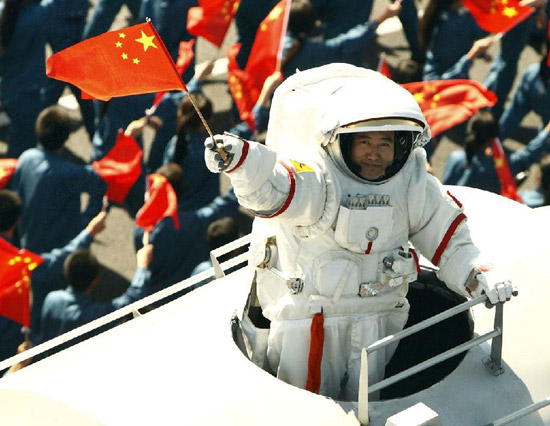
 |
| Chinese taikonaut Zhai Zhigang, dressed in his space suit, emerges from a simulated Shenzhou-7 capsule and waves a national flag during the parade of the celebrations for the 60th anniversary of the founding of the People's Republic of China, on Chang'an Avenue in central Beijing, capital of China, Oct. 1, 2009. (Xinhua/Fei Maohua) |
“It is urgent for China to launch its own Mars probe; if not, no much space will be left for us”, Ye Peijian, chief designer of Chang'e-1, China’s first moon probe, and chief commander of the Chang'e-2 and Chang'e-3 missions told People’s Daily.
What Ye said is reasonable. Since Earth and Mars are moving around the Sun, if we launch Mars probe at the time when the two planets get closer, then the transfer obit will need the least amount of energy. But the chance is once of every 26 months.
Core of probe to deep space is resource
As to the definition of deep space, there are slightly differences among different countries.
Despite the various definitions, exploration of deep space mainly includes research and observation of the solar system space, except Earth, all planets and their satellites and small celestial objects (asteroids and comets).
Why we study the space since we cannot solve all the problems on Earth? The question was often raised to Ye Peijian, chief designer of Chang'e-1, China's first moon probe, and chief commander of the Chang'e-2 and Chang'e-3 missions.
The most important reason is resource, Ye explained. There are four major resources in space: high position resource, environmental resource, material resource and information resource, which are all closely related with people's lives.
Compared to the environment on Earth, space environment features high purification and microgravity, which are greatly conductive to pharmacy, metallurgy and other areas, according to Ye. The capability of probe to deep space is a symbol of a country's political, economic and technological power. In a sense, the country that occupies the space dominates the world. [Read More]
Moon exploration enhances deep space exploration technology
Deep space exploration technology, as an important means for human beings to protect the earth, go into the universe, and look for a new home, is to become one of the main development direction of aerospace. Although full of challenges and risks and having encountered failures, human exploration of deep space never stops.
Since the United States and the former Soviet Union started the lunar exploration program in 1958, the world's developed countries and the major powers of Space Technology has carried out a variety of deep space exploration activities, and launched more than 200 detectors, including more than 120 for the moon, 40 for Mars and Venus respectively.
Ye said that all the planets of the solar system have been detected to varying degrees. The understanding of the solar system gained through deep space exploration activities is thousands of times more than the total knowledge mankind accumulated in thousands of years.
With regard to astronomical observations, human beings have sent astronomy satellite of different band into space, such as U.S. Gamma Ray Observatory, Advanced X-ray Astrophysics Facility (AXAF), Infrared Telescope Facility, NASA Infrared Telescope Facility (NASA IRTF), and Hubble Space Telescope which attracts the most attention.
As the leading project of the second lunar exploration phase, after finishing the required engineering validation and scientific exploration mission on June 9, 2011, Chang'e-2 went toward the Sun-Earth second Lagrange point (L2) which is 1.5 million kilometers away, and China has become the world's third country that have arrived at the L2 point, opening a new journey of deep space exploration. [Read More]
Four challenges of Mars exploration
China has no plan for Mars exploration at present. Therefore, experts have called for carrying it out as soon as possible.
Mars is regard as the most suitable inner planets for human settlements except Earth. It has been the first choice for global scientific and technological power’s planet exploration.
Ye Peijian, academician of Chinese Academy of Science, said the deep space exploration has two characters in the world: First, all the countries that have carried out lunar exploration will soon conduct Mars exploration. India, the country explored the Moon later than China, has already started the Mars exploration project; Second, So far in this century, more Mars explorations have been done than the moon. The world pays more attention to Mars.
However, he said, based on comprehensive consideration, China has no clear Mars exploration program at present.
Ye said in addition to solving the problem of long-distance monitoring and communication with the Mars probe 400 million kilometers away, there are still three problems.[Read More]
Read the Chinese version: 中国航天:探月之后还探啥Source: People's Daily; Author: Jiang Jianke and Yu Siyi


















![]()
